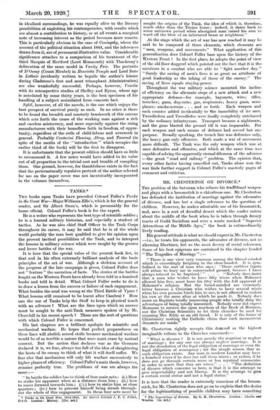TANKS.*
Two books upon Tanks have preceded Colonel Fuller's Tanks in the Great War—Major Williams-Ellia's, which is for the general
reader, and Sir Albert Stern's, which is presumably for the home official. Colonel Fuller's book is for the expert.
He is a writer who represents the best type of scientific soldier ; he is a learned military historian, and especially a student of tactics. As he was also chief Staff Officer to the Tank Corps throughout its career, it may be said that he is of the whole world probably the man best qualified to give his opinion upon the present tactical possibilities of the Tank, and to interpret the lessons in military science which were taught by the greater and lesser battles of the war.
It is here that the special value of the present book lies, in that and in his often extremely brilliant analysis of the basic principles of the art of war. Although a skeleton account of the progress of the late campaign is given, Colonel Fuller does not " feature " the narration of facts. The stories of the battles fought on the Western Front have already been told in a hundred books and told in detail. What Colonel Fuller seeks to do is to draw a lesson from the success or failure of each engagement.
What besides the mud was wrong at the Third Battle of Ypres ? What lessons still remained to be learnt after Cambrai ? How can the use of Tanks help the Staff to keep in physical touch with an advance ? What are the lines upon which an answer must be sought to the anti-Tank measures spoken of by Mr. Churchill in his recent speech ? These are the sort of questions with which Colonel Fuller is concerned.
His last chapters are a brilliant apologia for scientific and mechanical warfare. He hopes that perfect preparedness on these lines will abolish armed strife because mechanical warfare would be of so terrible a nature that wars must cease by mutual consent. But the nation that declares war as the Germans declared it is, we fear, always too full of the idea of slaughtering
the hosts of its enemy to think of what it will itself suffer. We fear also that mechanism will only lift warfare successively to higher planes of efficiency. Colonel Fuller's main thesis, however, remains perfectly true. The problems of war are always the same :—
" In battle the soldier has to think of four main acts (i.) How to strike his opponent when at a distance from him ; (ii.) how to move forward towards him ; (iii.) how to strike him at close quarters ; (iv.) how to prevent himself being struck through- out the whole of this engagement. In these four acts must be • Tanks in the Great War, 1914-1918. By Brevet Colonel J. F. C. Fuller. D.8.0. London: Murray. 121s. net.)
sought the origins of the Tank, the idea of which is, therefore, much older than the Trojan horse ; indeed, it dates back to some unknown period when aboriginal man raised his arm to ward off the blow of an infuriated beast or neighbour."
At the stage which the art of war has now reached it may bo said to be composed of three elements, which elements are " men, weapons, and movements." What application of this generalization does Colonel Fuller base upon the history of the Western Front ? In the first place, he adopts the point of view of the old Boer doggerel which pointed out the fact that it is the survivors in a combat who are able to " fight another day." " Surely the saving of men's lives is as great an attribute of good leadership as the taking of those of the enemy." The saving of lives equals staying-power.
Throughout the war military science mounted the incline of efficiency on the alternate steps of a new attack and a new appropriate defence—for example, bayonets, wire; rifles, trenches ; guns, dug-outs ; gas, respirators ; heavy guns, aero- planes ; smoke-screens . . . and so forth. Each weapon and each counter added incidentally to the immobility of its user. Tweedledum and Tweedledee were finally completely outclassed by the ordinary infantryman. Transport became a nightmare, and the guns blasted the ground till it was impassable. For each weapon and each means of defence had served but one purpose. Broadly speaking, the trench line was defensive only, the heavy gun only offensive. Both made a war of movement more difficult. The Tank was the only weapon which was at once defensive and offensive, and which at the same time was capable of solving the apparently eternal dilemma of the advance —the great " road and railway " problem. The opinion that, every other factor having cancelled out, Tanks alone won the war finds further support in Colonel Fuller's masterly pages of comment and criticism.




































 Previous page
Previous page